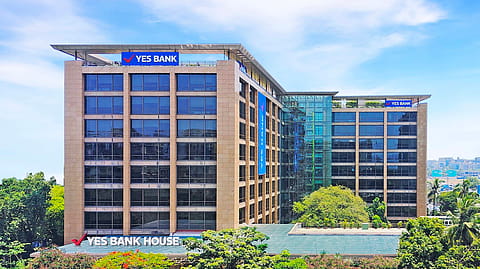SBI sells 13.19% stake in YES Bank to Sumitomo Mitsui Banking Corp for ₹8,890 cr
YES Bank shares hit the upper circuit as its market capitalisation climbs to ₹62,712.35 crore. The sale is part of SBI's efforts to lessen its stake in YES Bank, which it acquired during the bank's crisis in 2020

State Bank of India (SBI) will sell its 13.19% stake in private lender YES Bank Ltd. to Japanese financial services major Sumitomo Mitsui Banking Corp. (SMFG) for around ₹8,890 crore, according to an exchange filing.
SBI, which currently owns a 23.97% stake in YES Bank, was reportedly in talks with SMBC to sell up to 20% of its holding in the private lender. However, the current development reveals the sale of a slightly lower stake. With this acquisition, SMBC would become one of the largest investors in the bank.
"The Executive Committee of the Central Board (ECCB) of the Bank, in the meeting held on May 9, 2025, has accorded approval to divest 4,134,404,897 equity shares of YES Bank Limited (YBL), being equivalent to 13.19% (approx.) of YBL shares to Sumitomo Mitsui Banking Corporation (SMBC), at ₹21.50 per equity share, for a consideration of ₹88,88,97,05,285.50 (approximately ₹8,888.97 crore), subject to receipt of all regulatory and statutory approvals by the acquirer," SBI said in an exchange filing.
SBI said YES Bank contributed around ₹512 crore in net income and ₹2,571.87 crore in net revenue and surplus.
The lender expects the sale to be completed in the next 12 months. YES Bank said its board, in a meeting on May 9, 2025, approved the execution of a Share Purchase Agreement (SPA) between State Bank of India (SBI), Sumitomo Mitsui Banking Corporation (Purchaser), and YES Bank. Simultaneously, under separate share purchase agreements with HDFC Bank, ICICI Bank, Kotak Mahindra Bank, Axis Bank, IDFC First Bank, Federal Bank, and Bandhan Bank (collectively "other sellers"), the purchaser will acquire 2,136,830,297 equity shares (6.81%), YES Bank said.
Country's biggest public bank, SBI, in March 2020, acquired a majority stake in YES Bank when it was on the brink of collapse following governance issues and a substantial amount of bad loans.
The RBI, in order to thwart a major financial crisis, had roped in SBI and other banks to infuse fresh capital into the private lender. In return, SBI had acquired a 48.2% stake in Yes Bank, thus becoming its largest shareholder. Over time, as the financial situation of the bank improved, SBI reduced its stake in the bank. Since then, the PSU bank has been looking for an exit.
On May 3, YES Bank released its March quarter earnings report, with its net profit surging 63.3% year-on-year (YoY) to ₹738 crore. For the full financial year, the lender clocked a profit of ₹2,406 crore, up 92.3% from the year-ago fiscal.
The bank's fourth quarter net interest income (NII) came in at ₹2,276 crore, up 5.7% YoY, and the full year NII grew 10.5% to ₹8,944 crore. The net interest margin (NIM) for Q4 FY25 stood at 2.5%, showing a sequential upward trend, while the FY25 NIM remained at 2.4%, up 14.5% YoY at ₹5,857 crore.
Amid the development, YES Bank shares jumped 9.7% to hit the upper price band at ₹20.36 on the BSE, while its market capitalisation climbed to ₹62,712.35 crore.

